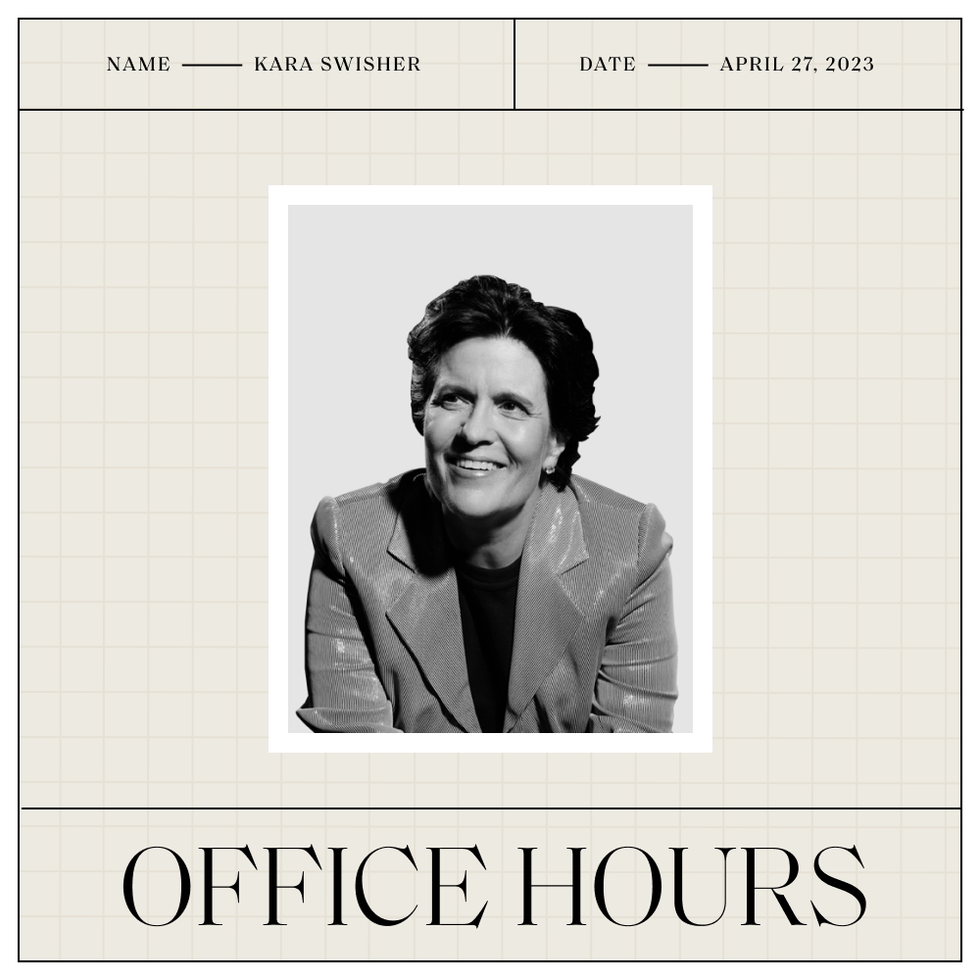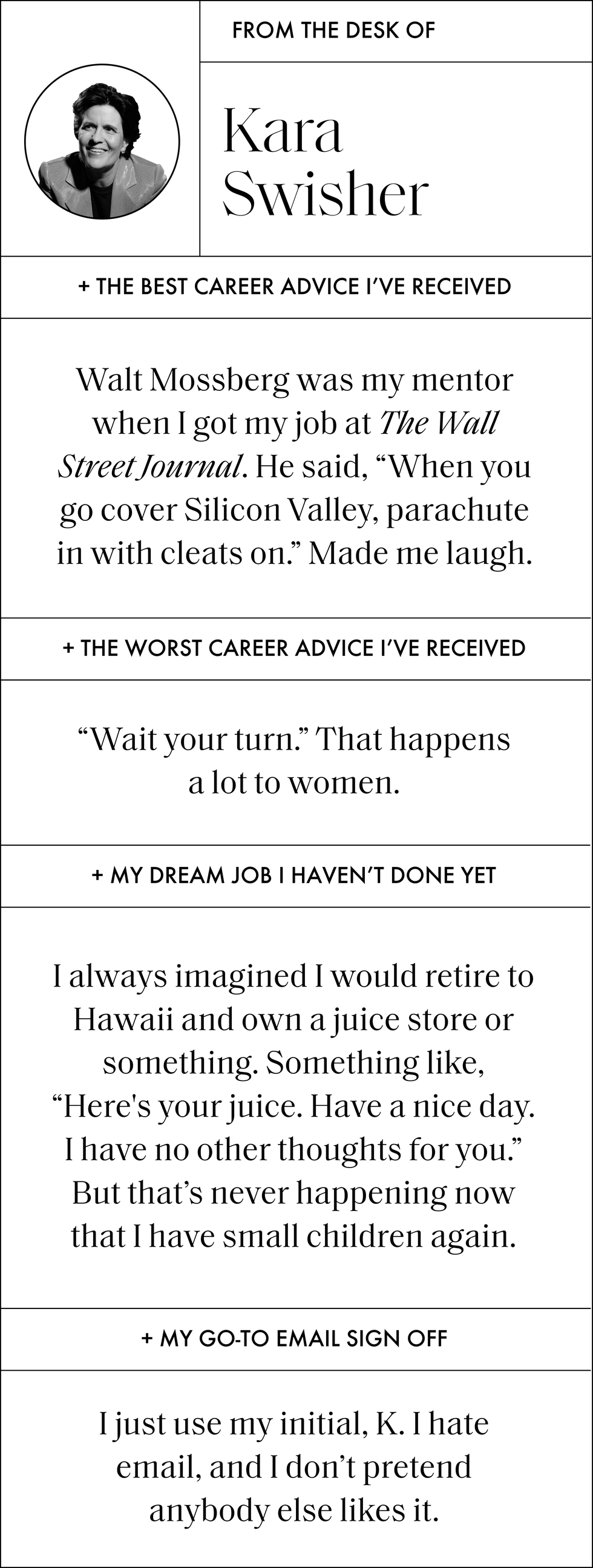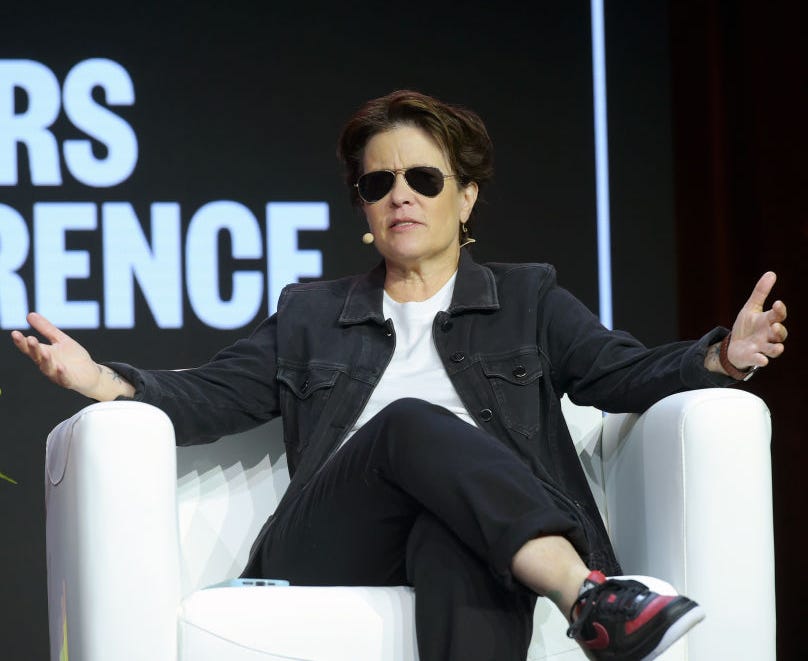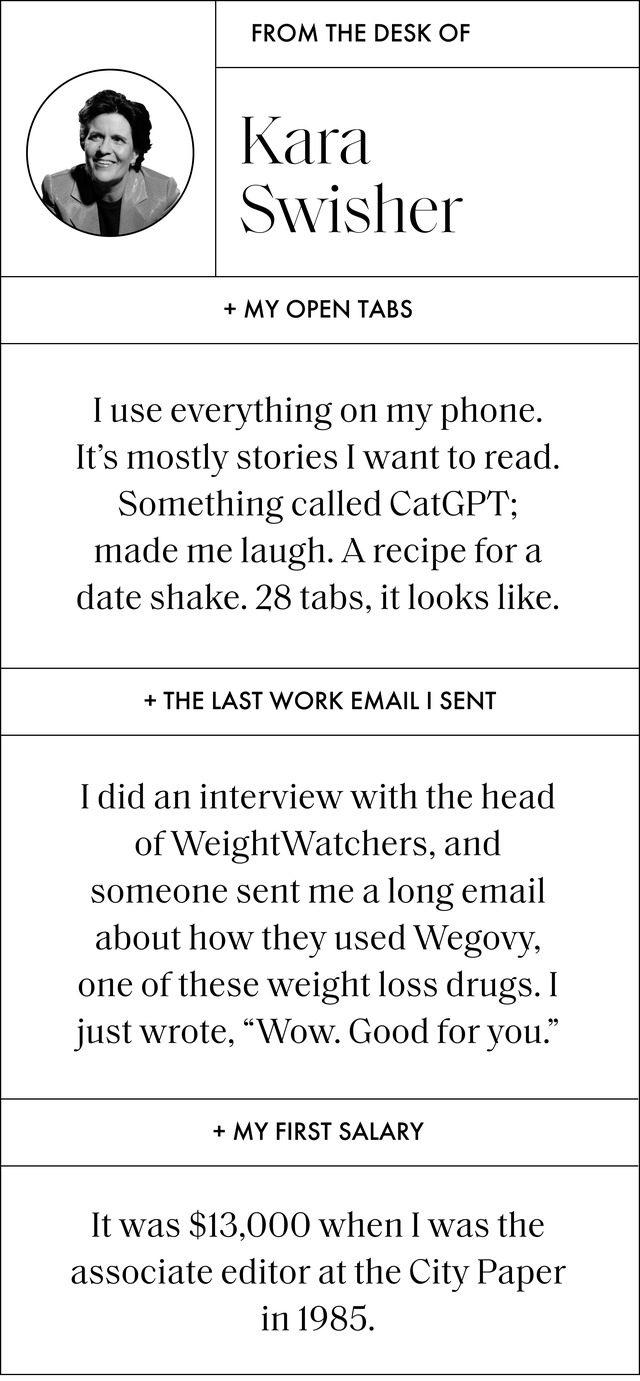Kara Swisher Isn’t Afraid to Ask ‘Obvious’ Questions
In ELLE.com’s monthly series Office Hours, we ask people in powerful positions to take us through their first jobs, worst jobs, and everything in between. This month we spoke to Kara Swisher, the veteran tech journalist who, throughout her career, has dominated all corners of the media industry—and made people like Mark Zuckerberg sweat in the process. She’s been a reporter and writer at some of the country’s biggest newspapers, including The Washington Post, The Wall Street Journal, and The New York Times; she co-founded Recode, the technology site Vox Media purchased in 2015, and the influential Code Conference; and over the years, she’s hosted a handful of podcasts, including her two current twice-weekly shows, Pivot and On With Kara Swisher. If her resume makes your head spin, you’re in luck: Swisher, who’s known for her unreserved interview style, is also working on a memoir—though it might be a while before you read it. “It’s not my nature to look backwards, so it bores me,” Swisher tells ELLE.com. “That’s why I’m a year and a half late.” She explains, “I don’t really care to reflect on my life and career.” Thankfully, for this column, she indulged us.
My first job
When I was in college, I sold Chipwiches during the summer in Washington, D.C. I sold them on the street in Georgetown, and I had to wear a pith helmet and tacky shorts, because they had a safari theme. And I had to say, “Put these chips between your lips,” which was repulsive. I was fired, because I wouldn’t take the cart down to the Mall on July 4. It was hot as fuck, and I was like, no, I’m not going to do this. But I was good. I sold a lot of Chipwiches.
My worst job
My worst job was with John McLaughlin. I’m very liberal, and he was this famous conservative who had this TV show called The McLaughlin Group, where they reduced really important issues of day to stupid yelling points. I ghostwrote his column for the National Review. He was a sexual harasser and an abusive boss. He didn’t sexually harass me, but he really bothered this young woman, who was a friend of mine. We went to a woman who was his chief of staff, and she said, “You two must be lying.” I’ll never forget it. Years later she came up to me, relatively recently, trying to apologize, saying it was a different time. I was like, “It wasn’t a different time. You were a terrible person. I don’t forgive you, so I don’t know what you’re going to do with that.”
My first big story
Probably my piece on the Haft family for The Washington Post. They were this very wealthy family in Washington, and I wrote it like King Lear. They all started fighting with each other, like on Succession essentially, and I chronicled that, and it was a big scoop for me. I worked on it for years, because this family kept suing each other. It riveted people and made people notice my work. Then, at the end of it, I didn’t want to cover them anymore. I was offered this internet beat; it wasn’t called the internet, it was called online. I was the young person in the office, so they said, “Let’s give this to Kara. She’s the young person. She’ll figure out ‘online.’” So that’s what I did. But it was because I wanted to get away from covering these terrible people.
What I think makes a good mentor
A lot of people who mentored me were incredibly successful people, and they recognized talent. They never felt threatened by me, even though probably I was there to replace them. I always was struck by how generous they were, given I was the next generation. I delivered mail at The Washington Post before I became an intern and then a reporter, and all the really talented people were the nicest people. It was a real learning experience. A real mentor is someone who’s really confident, doesn’t feel threatened by helping people, and thinks it’s additive to their career to do so.
Why I’m not scared to ask “obvious” questions
I think reporters are incredibly shy to ask interesting questions. I ask [subjects] directly. I don’t pretend that what’s obvious isn’t obvious. With Jon Stewart, his show is doing a lot better now, but it wasn’t initially. I [was] like, so you’re kind of becoming irrelevant. What do you think about that? Because people are saying that. I didn’t feel like I had to go, “But I like you.” Of course I like him. I think [other reporters] want to preserve the relationship, but I don’t think you have a relationship if you’re going to pull your punches. Smart people like smart questions, and they don’t like being kissed up to, and they don’t like being snarked at. I don’t snark at people. I listen to them. People are always surprised. They’re like, “Wait, you weren’t unfair.” Why would I be unfair? Also, I think these people can take it. I don’t want to be their friends. I don’t want to go on their boats. I don’t want to hang out with them. I have family. I have friends. I don’t need their approval.
How I know when it’s time to leave a job
I just do what I want. I always leave when I’m not happy. I always think I can get a job, I really do. So I feel confident. I’ve been confident my whole life. I’ve never really been on an achievement wheel in the way [a lot of] people are. I don’t feel like, if I don’t get this, oh no. I’m like, oh well. Then I’ll do something else. I can always leave. I really mean that. Across the globe are people who actually can’t leave. I’m not one of them, so I’m not going to feel bad for myself. If I don’t like something, I just do something about it.
Why I don’t feel the need to prove myself to others
One, being gay in a certain time was hard. People didn’t like you. At one point, I [was] like, there’s nothing I can do about it, because they’re stupid for using this as their measuring stick. When I saw people being unfair to me for no good fucking reason, I [was] like, well, then what do I care? It gives you a lot of strength. I think the AIDS crisis informed a lot of gay people. At the time, it was like, wow, they’re killing gay people. I’m not going to put up with this shit. Enough is enough. Then, my dad dying at 34. I was like, gosh, you could die at 34, and that’s it. Time is a very precious thing to me. I do what I want to do in the time I have. I’m very aware of time ticking by constantly.
How I’m raising sons in a world filled with toxic masculinity
We didn’t tolerate any kind of misbehavior by them in that regard. We tried to introduce them to a lot of people so they understood other people’s experiences. I think a lot of men, especially white men, feel safe all the time, so they don’t understand lack of safety. My son is 6’4”. He’s a big, handsome white guy in America. Athletic, educated. He sometimes doesn’t understand why people are unsafe, because why would he? I want them to at least have some empathy or understanding of other people’s experiences.
At one point, one of my sons was on a team where they had some song about women that was really rude. He didn’t do it, but he was there. And they taped it. He said, “Well, I didn’t sing it.” And I said, “But you didn’t stop it, and you laughed.” I know the pressure within a group of guys in a locker room is a certain thing, I get that. I said, “But you didn’t say anything, and you knew it was wrong.” It was really nice because at an assembly, he got up and said, “I should have said something, and I didn’t. I felt like I couldn’t.” We talked about it, and I think he learned from that.
How I handle balancing work and family
Whenever I have kid things, I tend to be like, “I can’t do that.” People get surprised. They’re like, “Well, can’t you move it around?” I’m like, “No, I have to go to my kid’s lacrosse game.” So I tend to prioritize them in general, but not always. If something’s really important at work, I feel bad, but I do it. [The balance is] a real struggle. We’re exhausted. We don’t spend as much time with friends. Something has to give.
This interview has been edited and condensed.

Madison is a senior writer/editor at ELLE.com, covering news, politics, and culture. When she’s not on the internet, you can most likely find her taking a nap or eating banana bread.





